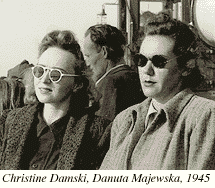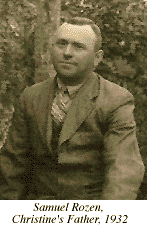CHRISTINE DAMSKI TELLS HER STORY (Conclusion)
 Warsaw:
Warsaw:
CHRISTINE DAMSKI: Spring '43, shortly after my mother left for Germany, it happened again; somebody in Olstyn told Johnny that he thought I wasn't really his wife, that I was Jewish. We left right away for Warsaw. At first we lived in the beautiful villa of Johnny's friend, Danuta Majewska. Her house was full of people working for the underground--pilots, refugees from western Poland; everybody was involved. There was an arsenal as well. The house had belonged to Danuta's late father-in-law, a doctor. Before the war it had been a private institution for mentally ill patients. Located in a quiet street, with an orchard and garden, surrounded by high walls, it was a very safe place for the underground. We lived there with all the others, as many as twelve people in one room.
While we were at Danuta Majewska's I learned that the Polish government-in-exile in London was sending money every month to be distributed to Jewish people in hiding. They needed couriers to help deliver the money, so I volunteered. That's how I discovered that my father was in hiding in Warsaw.
One day I was told to bring some money to six people from Zamosc; the contact was a man named Veigler. When I went to see him his first words were, "Your father is here!" He told me the story. As the Germans were rounding up the last Jews from Zamosc, my father and several others were able to bribe the railroad station attendants, and escaped by boarding the train for Warsaw. One of them--our family friend Mr. Garfinkle, who was also the president of the Zamosc
Judenrat
--had a relative in Warsaw who was married to a Polish lady.
 This lady had a friend, an old widowed lady, who was living in a tall apartment house--six or seven stories high--that was damaged by a bomb in '39. One section was almost completely destroyed, but a few rooms were left hanging, somewhat intact. The old lady ran a small hotel in the building, something like a pension, next to the destroyed section. Due to the danger, she had been ordered to close it off. She placed a large armoire in front of the door of the only room leading to the destroyed part, and behind that door she was hiding my father, another lady from Zamosc, and fifteen other Jews. She asked for absolutely nothing from them in return--not one cent.
This lady had a friend, an old widowed lady, who was living in a tall apartment house--six or seven stories high--that was damaged by a bomb in '39. One section was almost completely destroyed, but a few rooms were left hanging, somewhat intact. The old lady ran a small hotel in the building, something like a pension, next to the destroyed section. Due to the danger, she had been ordered to close it off. She placed a large armoire in front of the door of the only room leading to the destroyed part, and behind that door she was hiding my father, another lady from Zamosc, and fifteen other Jews. She asked for absolutely nothing from them in return--not one cent.
I hadn't talked to my father since he was released from jail in Zamosc; it was so hard to forgive him for betraying Julian. My mother never did. But I had been through so many things myself by then, of course I went to see him. We became close again. It was a place where I could go and spend a few hours each day. I brought him food and tobacco. He made cigarettes from the tobacco, which I sold.
Johnny and I found a room of our own on the top floor of an apartment house near the Polish Opera building. Everyone on that floor shared one bath, but we were by ourselves at last, not sleeping on the floor with ten other people. I was so happy. I hung beautiful curtains in the window. Johnny was working. I was visiting my father, and getting letters from my mother. I was even baking cookies for my mother, making up packages to send to her. She was living in an attic without heat in the Alps. About all they gave her to eat was black bread, ersatz coffee, and one bowl of soup a day, and this was a restaurant!
August 1, the
Uprising
started. When they started burning out the houses, instinctively I grabbed the bacon, some stale bread, and my fur coat. The city was burning, it was summertime--an inferno all around us--and I was wearing a fur coat. I didn't even feel the heat. You see, inside the shoulder pads I had sewn in diamonds and golden rubles; it was the money I had lived on through the whole war.
 Liberation: When the Russians finally liberated us, Johnny and I thought we would return to Zamosc, back to this town where I had grown up, gone to school, where before the war I was really somebody. No one wanted to see me now; no one greeted me on the street, and no one invited me to their home. Before the war I had never felt any anti-Semitism in Zamosc, but when I returned, people turned their backs. I didn't want to stay.
Liberation: When the Russians finally liberated us, Johnny and I thought we would return to Zamosc, back to this town where I had grown up, gone to school, where before the war I was really somebody. No one wanted to see me now; no one greeted me on the street, and no one invited me to their home. Before the war I had never felt any anti-Semitism in Zamosc, but when I returned, people turned their backs. I didn't want to stay.
Thank God, my mother and father survived. My sister died in Treblinka. She had to dig her own grave. After the war, my mother was still hoping that my brother had survived. When he didn't come back, she divorced my father; she said she couldn't live with him. I have a letter from my father after the divorce, full of tears. He wrote that my mother was an angel, and he was the most unhappy man. I keep it with me all the time.
After the war John and Christine married officially. From Zamosc, they moved to Gdansk, and subsequently emigrated with Christine's mother to the United States. About the same time, Christine's father, Samuel Rozen, emigrated to Israel.
Christine Damski gave this interview in her Los Angeles home on May 14, 1988.
 This lady had a friend, an old widowed lady, who was living in a tall apartment house--six or seven stories high--that was damaged by a bomb in '39. One section was almost completely destroyed, but a few rooms were left hanging, somewhat intact. The old lady ran a small hotel in the building, something like a pension, next to the destroyed section. Due to the danger, she had been ordered to close it off. She placed a large armoire in front of the door of the only room leading to the destroyed part, and behind that door she was hiding my father, another lady from Zamosc, and fifteen other Jews. She asked for absolutely nothing from them in return--not one cent.
This lady had a friend, an old widowed lady, who was living in a tall apartment house--six or seven stories high--that was damaged by a bomb in '39. One section was almost completely destroyed, but a few rooms were left hanging, somewhat intact. The old lady ran a small hotel in the building, something like a pension, next to the destroyed section. Due to the danger, she had been ordered to close it off. She placed a large armoire in front of the door of the only room leading to the destroyed part, and behind that door she was hiding my father, another lady from Zamosc, and fifteen other Jews. She asked for absolutely nothing from them in return--not one cent.
 Warsaw:
Warsaw:
 Liberation: When the Russians finally liberated us, Johnny and I thought we would return to Zamosc, back to this town where I had grown up, gone to school, where before the war I was really somebody. No one wanted to see me now; no one greeted me on the street, and no one invited me to their home. Before the war I had never felt any anti-Semitism in Zamosc, but when I returned, people turned their backs. I didn't want to stay.
Liberation: When the Russians finally liberated us, Johnny and I thought we would return to Zamosc, back to this town where I had grown up, gone to school, where before the war I was really somebody. No one wanted to see me now; no one greeted me on the street, and no one invited me to their home. Before the war I had never felt any anti-Semitism in Zamosc, but when I returned, people turned their backs. I didn't want to stay.